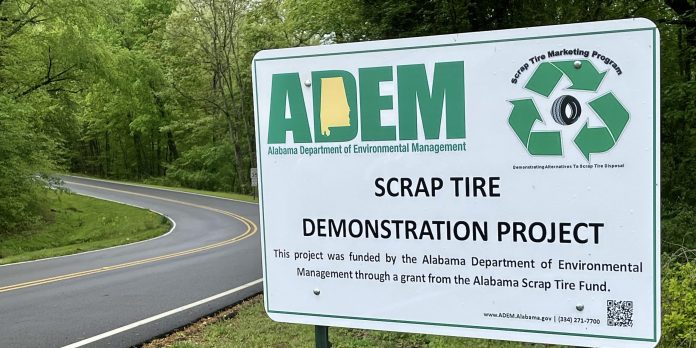ROGERSVILLE – Officials with the Alabama Department of Conservation and Natural Resources and the Alabama Department of Environmental Management cut a ceremonial ribbon Friday for resurfaced roads at Joe Wheeler State Park paved with asphalt made with materials from scrap tires.
Roads inside Joe Wheeler State Park had not been repaved since the 1990s, and ADEM provided a $1.16 million grant to Alabama State Parks for repaving using asphalt modified with rubber from ground-up tires. One dollar from the sale of each tire in the state goes into the state’s Scrap Tire Fund, which is used to remove scrap tires from illegal dumps, along roadsides and other places, as well as promote the recycling of discarded tires.

At a ribbon-cutting ceremony today at Joe Wheeler State Park, ADCNR Commissioner Chris Blankenship said the park’s new pavement is stronger, smoother and will last longer, thanks to its rubber composition.
“It’s always wonderful when two state agencies can work together for the betterment of Alabama’s residents,” Blankenship said. “We are incredibly grateful to ADEM, especially knowing the material used in the asphalt will require less maintenance and should last longer by holding up better in a wide variety of weather conditions. The smoother ride is definitely more pleasant for park-goers.”
The ADEM grant helped cover the cost of repaving roads inside the park, including the long access road from U.S. 72 to the park’s lodge.
ADEM Director Lance LeFleur said the paving at Joe Wheeler shows how discarded tires can be used to benefit the public.
“Old scrap tires are often a nuisance, because they’re all too often not disposed of properly,” LeFleur said. “Just about every Alabamian has seen discarded tires on roadsides, which often collect water and become breeding grounds for pests such as mosquitoes. Tires can also fill up landfills, which is something we also don’t want to happen.
“The best way to deal with old tires is to find an alternative use, which creates a market for them. Using recycled tires for asphalt is a perfect example of a beneficial use of discarded tires.”
LeFleur said the Scrap Tire Fund is also used to reimburse local governments for the costs associated with cleaning up unauthorized tire dumpsites and picking up discarded tires along roadways.
Studies have shown that asphalt made with recycled tires has a long list of advantages over traditional asphalt. In addition to lasting up to 50% longer and being less prone to potholing and cracking, rubber-modified asphalt reduces tire wear, is quieter, improves fuel mileage because of lower rolling resistance, and is safer because of better traction and reduced misting on wet roads.
Blankenship said rubber-modified asphalt has also been used in repaving projects at Lake Guntersville State Park and DeSoto State Park in recent years.
“This is another way that we can make sure our guests have a first-class experience when they visit our State Parks,” he said. “In fact, it’s an investment, because these roads will hold up better over time and save money in the long run, while also helping make visitors feel more welcome at our parks.”
The event also celebrated construction of the park’s new beach pavilion, where the ribbon-cutting was held. A tornado destroyed the beach pavilion in December 2019, and the new facility has been a welcome addition for park visitors.
Don’t miss out! Subscribe to our email newsletter to have all our smart stories delivered to your inbox.



